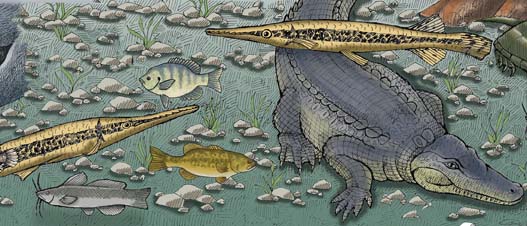

The American alligator was once thought to be an annoying pest. They showed up in people's pools and golf courses and ate game fish that people liked to catch. So the American Alligator was hunted without limit until it became an endangered species, on the verge of extinction. Then people realized something odd. As the alligators disappeared, so did all those game fish that they liked to catch. That was when they realized that the alligators' favorite food, a large fish called a gar, had had a population explosion with no alligators to keep their numbers down. Can you guess what gar like to eat? They like to eat many kinds of game fish. So, with no alligators to keep their numbers down, there were too many gar gobbling up all the fish. Then the alligator was put on the endangered species list in 1967 and protected from hunting. Over time, their numbers began to recover and the gar populations came under control. What do you think happened to the fish populations? The fish could come back too. The ecological balance returned to the ecosystem.
A keystone species is a species that affects all the other species in its ecosystem. The American alligator is just one example of these important animals. When the American alligator became endangered, the game fish disappeared too.
To fix the problem, the American alligator was put on the endangered species list in 1967 and protected from hunters until its numbers returned to a safe level. They came off the list again in 1987 when the U.S. Fish and Wildlife Service thought they were at a safe level for survival.
Learning about how we affect wildlife is a great way to help protect them. Keep learning!
(Included in PDF)
Keystone Species - Otters, Alligators and Elephants - Read and React
1. What happened to the other species in the coastal waters when the sea otter was hunted almost to extinction:
2. What was the balance between the American alligator, the gar and the game fish?
3. How does the elephant keep the African savannah habitat right for the other animals living there?
When you research information you must cite the reference. Citing for websites is different from citing from books, magazines and periodicals. The style of citing shown here is from the MLA Style Citations (Modern Language Association).
When citing a WEBSITE the general format is as follows.
Author Last Name, First Name(s). "Title: Subtitle of Part of Web Page, if appropriate." Title: Subtitle: Section of Page if appropriate. Sponsoring/Publishing Agency, If Given. Additional significant descriptive information. Date of Electronic Publication or other Date, such as Last Updated. Day Month Year of access < URL >.
Amsel, Sheri. "Keystone Species - The American Alligator" Exploring Nature Educational Resource ©2005-2024. December 14, 2024
< http://www.exploringnature.org/db/view/1790 >
